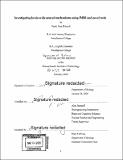Investigating brain-wide neural mechanisms using fMRI and novel tools
Author(s)
Bricault, Sarah Jean.
Download1418760809-MIT.pdf (14.27Mb)
Other Contributors
Massachusetts Institute of Technology. Department of Biology.
Advisor
Alan Jasanoff.
Terms of use
Metadata
Show full item recordAbstract
Defining the neural mechanisms that coordinate behavior requires characterizing the activity dynamics of diverse brain regions and neural circuit elements. My thesis explores such dynamics to help understand brain-wide processing of rewarding and aversive stimuli relevant to decision making. My primary experimental tool is functional magnetic resonance (fMRI), applied in anesthetized and awake rats, and I introduce methodologically significant innovations along with my scientific work. In the first part of my thesis, I investigate the neural bases of responses to intracranial rewarding and aversive stimuli. Comparison of psychometric and fMRIbased measurements identifies a putative site for reward integration in the nucleus accumbens (NAc), and targeted pharmacological inactivation of this region correspondingly distorts the evaluation of reward magnitudes in an operant task. My results dissociate processing of stimuli of opposite valence, by combining rewarding and aversive stimuli in a decision-making task and demonstrating that the two stimuli are processed independently. A limitation of these imaging studies is that they are performed in sedated animals. I therefore introduce a protocol for investigation of brain-wide neural dynamics in awake, paralyzed rats. I characterize intrinsic dynamics of brain function in this preparation, and argue that it constitutes a promising basis for further investigations of behaviorally relevant neural function. In the final part of my thesis, I describe a new tool for perturbation of brain dynamics using image-guided pharmacological interventions. The tool is a conjugate of the inhibitory drug muscimol to a paramagnetic contrast agent. I show that this reagent allows neurophysiological consequences of local inhibition to be characterized in spatial and temporal dimensions, creating a facile basis for assessing the contributions of drug-targeted structures. My work thus establishes a platform for hypothesisdriven investigation of distributed neural mechanisms involved in a broad range of contexts.
Description
Thesis: Ph. D., Massachusetts Institute of Technology, Department of Biology, 2020 Cataloged from the printed version of thesis. Includes bibliographical references.
Date issued
2020Department
Massachusetts Institute of Technology. Department of BiologyPublisher
Massachusetts Institute of Technology
Keywords
Biology.